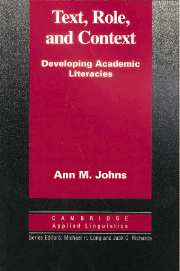Book contents
- Frontmatter
- Contents
- Series editors' preface
- Preface
- Acknowledgments
- 1 Literacy and pedagogy: Three views
- 2 Genre knowledge and socioliteracies: What readers and writers may share
- 3 Genre and social forces: “Homely” and academic texts
- 4 Discourse communities and communities of practice: Membership, conflict, and diversity
- 5 Special roles: Literacy practitioners as campus mediators and researchers
- 6 Students as researchers: Investigating texts, processes, and contexts
- 7 The socioliterate classroom: Basic tenets and goals
- 8 Putting tenets and goals into practice: Using portfolios in literacy classrooms
- 9 Conclusion
- References
- Index
6 - Students as researchers: Investigating texts, processes, and contexts
Published online by Cambridge University Press: 05 October 2012
- Frontmatter
- Contents
- Series editors' preface
- Preface
- Acknowledgments
- 1 Literacy and pedagogy: Three views
- 2 Genre knowledge and socioliteracies: What readers and writers may share
- 3 Genre and social forces: “Homely” and academic texts
- 4 Discourse communities and communities of practice: Membership, conflict, and diversity
- 5 Special roles: Literacy practitioners as campus mediators and researchers
- 6 Students as researchers: Investigating texts, processes, and contexts
- 7 The socioliterate classroom: Basic tenets and goals
- 8 Putting tenets and goals into practice: Using portfolios in literacy classrooms
- 9 Conclusion
- References
- Index
Summary
To analyze school or university writing in the light of the recent reconception of genre is a demystifying move, in that it, for instance, affords explanations of conventional forms that previously appeared arcane or arbitrary. The effect, however, is to make both the texts and the pedagogical issues look more complex than before (Freedman & Medway, 1994b, p. 12).
We need to bring students to the point of cultural self-consciousness in which they neither accommodate nor merely oppose the social order – both positions being still circumscribed by the structure – but can actively position themselves within it (Herndl, 1993, p. 215).
The most important factor in the success of any pedagogy is the student. Unless we can motivate our students, providing them with tools and experiences that are relevant to their current and future lives outside of our literacy classrooms, we are not doing our jobs. Though we cannot hope to predict all of their possible literacy experiences, we can help students to ask questions of texts, of contexts, of experts – and of themselves. By opening our literacy classroom doors to a variety of possibilities within text worlds and text processing, we can collaborate with students as they acquire an enriched understanding of the challenges, possibilities, and problems for their literate academic and professional lives.
This chapter is devoted to student research. I use the term, “research” broadly, as I did in the previous chapter, to refer to the investigation of a problem or question of interest. Some of what is discussed here could be referred to as “critical thinking” or effective group work; undoubtedly, one of the many benefits of encouraging students to become researchers is that they have much to talk, read, and write about within their literacy classes. However, the activities suggested in this chapter are more focused: They are designed specifically to encourage ongoing student inquiry into texts and genres, their own literate lives, and the literacy practices of others, so that they may be better prepared to position themselves within academic and other social contexts.
- Type
- Chapter
- Information
- Text, Role and ContextDeveloping Academic Literacies, pp. 92 - 113Publisher: Cambridge University PressPrint publication year: 1997

